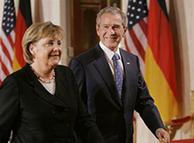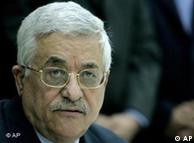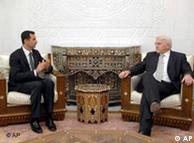Bush Backs Merkel's Middle East Quartet Plans
US President George W. Bush has agreed to German Chancellor Angela Merkel's call for a new Middle East peace push and said he was sending Secretary of State Condoleezza Rice to the region shortly.
"When we solve that problem, a lot of other problems will be easier to solve," Bush said after talks at the White House with Merkel on Thursday. "I'm optimistic that we can achieve that objective."
"Condoleezza Rice will be going to the Middle East here shortly. She'll come back to report to not only me, but also to the chancellor about how we can move the process forward," he said at a joint public appearance with Merkel.
Germany has laid out an ambitious agenda, including plans to revitalize the so-called quartet for Middle East peace comprising the EU, the United States, Russia and the United Nations, at what it considers to be an auspicious time.
"Madam Chancellor had a good idea to convene the quartet, which I agreed to. I think the quartet ought to meet at an appropriate time," said Bush, whom critics accuse of neglecting the peace process in favor of the Iraq war.
"I think this is the right point in time to take some time and reflect what the quartet can actually do in order to bring about a solution," Merkel said through an interpreter.
Bildunterschrift: Großansicht des Bildes mit der Bildunterschrift: The EU should strengthen Palestinian President Abbas, Merkel said
Merkel's US visit, her third since taking office nearly 14 months ago, came after Germany assumed the six-month presidency of the European Union and the year-long leadership of the Group of Eight industrialized countries.
Moscow's backing
"We would like the European Union to speak with one and the same voice, saying: 'We want a two-state solution. We want the recognition of the state of Israel by the Palestinians. We want to strengthen (Palestinian) President (Mahmoud) Abbas,'" she said.
A German foreign ministry spokesman said Wednesday that Berlin hoped to call a quartet meeting "as soon as possible" and had already won Russian support for the initiative.
"We also want to strengthen, to bolster, the evolution of a strong Lebanon. We discussed this today, too, and we also discussed the measures that we think need to be taken," said Merkel.
Bush, who rejected calls to broaden the quartet's mandate to issues like Lebanon, said the key there was to move "as fast as possible" with the tribunal for the murder of Lebanese ex-premier Rafiq Hariri in February 2005.
Bildunterschrift: Großansicht des Bildes mit der Bildunterschrift: The US was critical of German Foreign Minister Steinmeier's meeting with Syrian President Assad (l.) last month
As he has in the context of Iraq, Bush rejected direct talks with Syria, saying the Syrians "can be a much more constructive partner, and they haven't been. They don't need to be told that in meeting after meeting after meeting."
Merkel, who said the quartet already "has its work cut out for it" with the Middle East peace process, declared that "Syria needs to be given a push" on Lebanon and that Damascus had squandered chances to play a more positive role.
Common position on Kyoto
On another front, Bush said he saw "a chance now to put behind us the old, stale debates of the past" on climate change but offered no concessions to European critics of Washington's refusal to back the Kyoto Protocol.
The EU wants to forge a common position for negotiations on the successor to the Kyoto pact, which aims to control greenhouse gases, by March. Germany would like the 27-nation bloc to commit to reducing harmful emissions by 30 percent by 2020.
"Between the European Union and the United States, I think there's a wide scope for further talks on this," Merkel said, amid European frustration at a the US refusal to ratify the pact, which runs out in 2012, or offer a viable alternative.
Bush said he hoped Sudan would "make more progress" in allowing "not only security, but goods and supplies provided to the people" in its violence-wracked province of Darfur.
The US president also said it was important to "follow through" on a UN Security Council resolution aiming to punish Iran for not freezing sensitive atomic activities that could fuel nuclear bomb development.
A fine solution provided by Chancellor Merkel




No comments:
Post a Comment